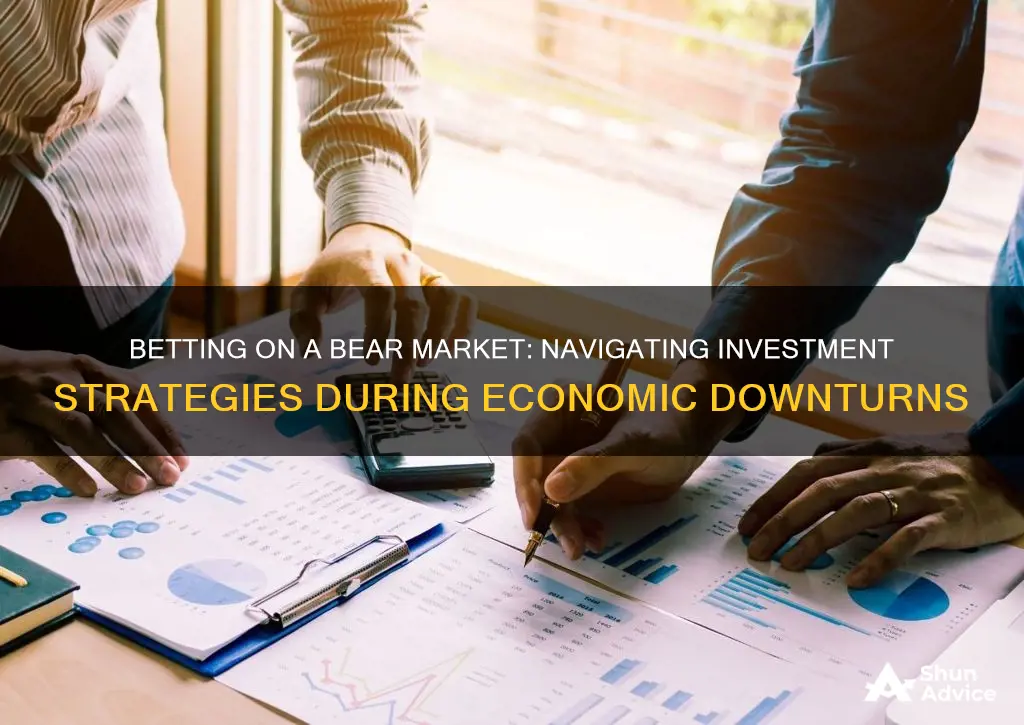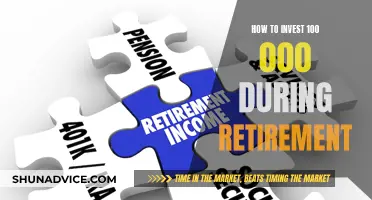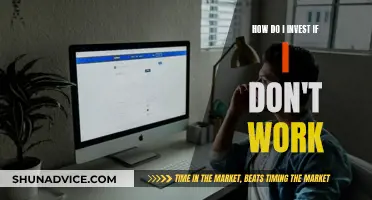
If you think the economy will fall, there are a few investment options that could be worth considering.
Firstly, it is important to note that giving up on stocks completely might not be the best idea. Instead, it might be worth seeking out core sector stocks in industries such as healthcare, utilities and consumer goods. These sectors tend to do well during economic downturns as people will still spend money on medical care, household items, electricity and food.
Dividend stocks can also be a good option as they provide a steady stream of income. Look for companies with low debt-to-equity ratios and strong balance sheets.
Another option to consider is investing in precious metals such as gold and silver, as their demand and price usually go up during recessions.
If you are interested in investing in real estate, a recession could be a good time to buy investment properties as home values tend to drop.
Finally, investing in yourself is always a good idea. This could mean gaining additional knowledge or skills through education, or paying down debt to reduce financial stress during an economic crisis.
Remember, investing during a recession is not for the faint of heart and it is important to do your own research or consult a financial advisor before making any investment decisions.
What You'll Learn

Invest in core sectors like healthcare, utilities and consumer goods
If you think the economy will fall, it's a good idea to invest in core sectors like healthcare, utilities, and consumer goods.
Healthcare is an essential service that people will continue to need regardless of the state of the economy. Demand for healthcare is consistent, and even with declines in overall income, people will continue to spend on quality healthcare. As such, the healthcare and pharmaceutical industries are expected to be relatively recession-proof.
Utilities are also considered defensive investments as they provide essential services such as electricity, heat, and gas that people will continue to need regardless of economic conditions. Energy companies can pass on higher costs to consumers, allowing them to maintain profitability even during economic downturns.
Consumer goods, particularly staples such as food and beverages, household goods, and hygiene products, are another sector to consider. These are products that consumers are unwilling or unable to give up, regardless of their financial situation. Companies in this sector will experience growth and accumulate capital, enabling them to expand further.
When considering investments in these sectors, look for companies with solid histories of performance and strong balance sheets. It is also important to diversify your portfolio to minimize risk.
Healthcare:
- Johnson & Johnson
- UnitedHealth Group
- Pfizer
- Thermo Fisher Scientific
- Baxter International
Utilities:
- Duke Energy
- Exelon Corporation
- American Water Works
- NextEra Energy
Consumer Goods:
- Procter & Gamble
- Hershey
- Coca-Cola
- PepsiCo
- Unilever
Retirement Readiness: Smart Investing in Your 20s
You may want to see also

Focus on reliable dividend stocks
Dividend stocks are a wise option for investors looking for passive income. They are generally considered safer than growth stocks or other stocks that don't pay dividends. Dividend stocks are also known for being stable and reliable investments.
However, it's important to note that not all dividend stocks are the same, and they can come with risks. Here are some things to keep in mind if you're considering investing in dividend stocks:
- High yield isn't always best: A high dividend yield may not always indicate a good investment opportunity. If a company is returning a large portion of its profits to investors instead of reinvesting in its growth, it could be a sign that management prefers not to invest in the company's future. Look at the dividend payout ratio, which measures the percentage of profits paid out to shareholders, to assess if the company still has the flexibility to reinvest and grow.
- Dividend stocks can be exciting: While utility companies and slow-growth businesses are often associated with high dividend payouts, dividend stocks can be much more exciting. Look for stocks with the potential for dividend growth or a commitment to raise dividends, even if the current yield is low. Financial flexibility, organic growth, and low debt levels are positive indicators for dividend growth.
- Dividend stocks aren't always safe: Dividend stocks are often considered safe, but it's important to evaluate how management is using the dividend in its corporate strategy. Sometimes, companies may use dividends to placate frustrated investors when the stock isn't performing well. During challenging economic times, companies may reduce or eliminate dividends.
- Reinvesting dividends: Reinvesting dividends can significantly enhance your return on investment. Dividends typically increase the return of a stock by a few percentage points. For example, the historical total annual return of the S&P 500, including dividends, has been about two percentage points higher than the index's annual change in value.
- Evaluating dividend stocks: When considering a dividend-paying stock, compare the dividend yields among its peers. A company with a much higher dividend yield than similar companies could be a red flag. Also, examine the payout ratio to ensure it's not too high (generally above 80%), as it may indicate that the company is putting a large portion of its income toward dividends.
- Building a portfolio: If you're buying individual dividend stocks, ensure you have a diversified portfolio. Determine how much of your portfolio to allocate to each stock, considering the riskiness of the stock. For riskier stocks, you might want to buy less, while for safer choices, you can allocate a larger percentage.
- Tax considerations: Keep in mind that dividends in taxable brokerage accounts are taxed in the year they occur, unlike stocks that don't pay dividends, which are typically taxed when sold. For investors in high-income brackets, dividend stocks might not be the most tax-efficient option.
- Reliable dividend stocks: If you're looking for dividend stocks with a low risk of cutting dividends, consider the "dividend aristocrats". This group of S&P 500 companies has increased their dividends annually for at least 25 years.
In summary, dividend stocks can be a great choice for investors, especially those seeking passive income. However, it's important to carefully evaluate each company's dividend policy, payout ratio, and financial health before investing.
ARSO's Strategic Play: Navigating Investment Roles in Town of Salem
You may want to see also

Consider buying real estate
If you're thinking about what to invest in when the economy is struggling, one option to consider is buying real estate.
Real estate is a great investment to hedge against crashes in the stock market, as its performance is often less correlated with stocks. It's also a good way to diversify your portfolio.
One way to invest in real estate is through Real Estate Investment Trusts (REITs). REITs are a good option if you want exposure to the real estate market but need liquidity. They invest in a variety of properties, including apartments, offices, and lodging, and they generally pay higher dividends than many other investments. While REITs are not risk-free, their performance is subject to different volatility patterns than traditional stock investments.
Another option is to buy rental housing. This strategy can provide a regular cash flow, but it requires more hands-on management than REITs. You'll need to select the right property, finance or buy it outright, maintain it, and deal with tenants.
If you're considering investing in real estate, it's important to remember that it's a long-term commitment. It may be challenging to sell your property quickly if you need to free up cash. Additionally, the real estate market can be unpredictable, and there may be periods of slow growth or even declines in property values.
Before investing in real estate, it's crucial to do your research and carefully evaluate your financial situation and risk tolerance. Consult with a qualified financial advisor to determine if real estate is a suitable investment for you and to understand the potential risks and rewards.
Investing During Depressions: Strategies for Success
You may want to see also

Purchase precious metal investments like gold or silver
Gold and silver are popular investments for those who believe the economy will fall. Many investors hold gold and silver to hedge against various economic crises.
Gold's value typically increases when the overall market struggles. For example, between 2008 and 2011, gold's price rose more than 100% as the economy struggled through the Great Recession and moved into recovery.
However, it's important to note that gold's price can initially fall during a stock market crash. During the 2008 financial crisis, gold dropped in the initial shock, but then rebounded and ended the year up 5.5%. Over the total 18-month stock market selloff, gold rose more than 25%.
Silver, on the other hand, has not historically performed as well as gold during stock market crashes. Silver has high industrial use (about 56% of its total supply) and stock market selloffs are usually associated with a poor or deteriorating economy. Silver rose in only one of the S&P selloffs and was basically flat in another one.
Therefore, if you're considering investing in precious metals as a hedge against an economic downturn, gold may be a better option than silver. However, it's always important to do your own research and consult with a financial advisor before making any investment decisions.
Stocks to Buy: Top Picks
You may want to see also

Invest in yourself by gaining new skills or paying off debt
Investing in yourself is one of the best ways to increase your income and quality of life. Here are some reasons why gaining new skills or paying off debt are good investment options, especially during uncertain economic times:
Gaining New Skills
The job market is constantly evolving, and it is crucial to adapt and enhance your skill set to remain competitive. Investing in your professional development demonstrates a forward-thinking mindset and a commitment to self-improvement. This can be particularly beneficial if you are pursuing skills in high-demand fields, such as cybersecurity, which offers numerous job opportunities and competitive salaries.
Benefits of Learning
- Career Success and Fulfillment: Upskilling can lead to career advancement, higher income, and increased job satisfaction. It can open doors to new career paths and help you stay competitive in the job market.
- Personal Growth: Adopting a growth mindset, as Stanford psychologist Carol Dweck describes it, means believing that your abilities can be cultivated through effort, strategy, and learning from others. This mindset can empower you to take risks, embrace challenges, and view failures as opportunities for growth.
- Transferable Skills: Developing a broad range of skills, including soft skills like communication, collaboration, and empathy, can make you more adaptable and attractive to potential employers across various industries.
Paying Off Debt
Managing and reducing your debt is an important aspect of financial planning and can have a significant impact on your overall financial health and well-being.
Benefits of Paying Off Debt
- Reduced Interest Burden: Paying off high-interest debt, such as credit card debt, is often a wise financial decision. Credit card interest rates can be extremely high, often exceeding the returns you might expect from typical investments.
- Improved Credit Score: Paying off debt can positively impact your credit score. A good credit score is essential when applying for loans, renting an apartment, or even when seeking employment, as it reflects your financial responsibility and stability.
- Peace of Mind: Being burdened by debt can cause significant stress and anxiety. Eliminating or reducing debt can improve your mental well-being and overall quality of life.
Finding a Balance
It is important to note that you don't necessarily have to choose between investing in new skills and paying off debt. Finding a balance between the two can help you achieve your financial goals while also investing in your personal growth and career development.
Consider the following strategies to achieve this balance:
- Prioritize High-Interest Debt: Focus on paying off debts with the highest interest rates first, such as credit card debt. This will help you save money in the long run.
- Create an Emergency Fund: Establish a savings fund to cover unexpected expenses. This will help you avoid accumulating more debt in the future.
- Debt Management Plans: Explore debt relief options, such as debt management plans, which can help lower your monthly payments and reduce interest charges.
- Increase Your Income: Consider taking on a side hustle or an additional source of income to accelerate debt repayment and free up funds for investing in new skills.
In conclusion, investing in yourself by gaining new skills and paying off debt are both valuable strategies for improving your financial situation and overall well-being. By finding a balance between these approaches, you can set yourself up for career success and a more secure financial future, even during uncertain economic times.
Investment Strategies: Navigating the Ideal Percentage of Your Paycheck to Invest
You may want to see also
Frequently asked questions
Some good investments to make during a recession include consumer staples, utilities, healthcare stocks, and dividend stocks.
It is best to avoid speculative investments and day trading during a recession. It is also important not to try and time the market by selling when prices are low and buying when they are high.
Ensure you have plenty of emergency savings, are not planning on touching your portfolio for at least seven years, and refrain from obsessively checking your portfolio.
Alternative investments during a recession include real estate, precious metals, and investing in yourself by gaining new skills or paying down debt.







